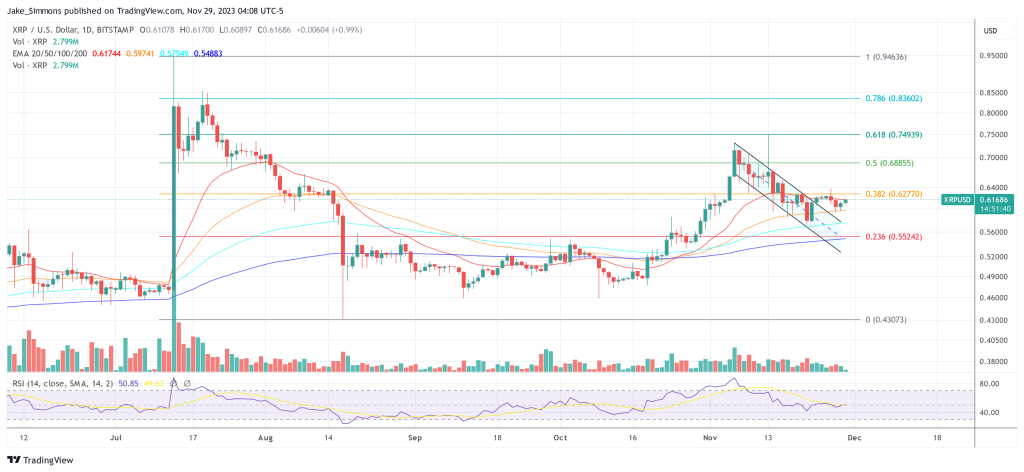Ripple CTO Calls For Congressional Action On Securities Laws
The Chief Technology Officer (CTO) of Ripple Labs, David Schwartz, delivered a nuanced perspective on the complexities surrounding the classification of tokens as securities yesterday. Although he did not mention XRP, it seems clear that he is talking about Ripple’s battle with the US Securities and Exchange Commission (SEC). His analysis delves deep into the intricacies of the Howey test and its application on cryptocurrencies, like XRP.
Schwartz opened his post on X by stating, “I’ve talked a little bit about US securities law, and I’m going to do that a little bit more. As most of you know, the primary argument that some tokens are securities comes from the inclusion of ‘investment contracts’ in the list of things that are securities.”
Ripple CTO Analyzes The Howey Test
First, Schwartz addressed the flexible nature of the Howey test, a critical tool used in determining whether an asset is a security. He stated, “What [court cases] have shown is that Howey is a flexible test that can’t just be applied robotically.” He argued that the original Howey requirement for profits to come “solely” from the efforts of others has been adapted in subsequent cases to include influences from market forces and other external factors.
Expanding on this, the Ripple CTO highlighted the ambiguous nature of each requirement in the Howey test. He pointed out, “Howey says you need an ‘investment of money’ but there are cases that say sometimes something given for free can be an investment contract.” This interpretation suggests that the traditional understanding of an investment can extend beyond monetary contributions, complicating the classification of digital assets.
Schwartz then addressed the broader purpose of securities laws, underscoring their role in preventing fraud. He questioned the necessity of these laws given the existing illegality of fraud, stating, “It’s primarily because securities fraud can be hard to detect and punish.”
He emphasized that securities laws are designed to make securities fraud more challenging to commit, notably by imposing disclosure requirements on those seeking public investment.
Further, Schwartz explored the legal precedents and their implications for digital assets. He examined the difference between investment contracts in cases like Howey and the treatment of other assets, such as collectibles and artworks. Schwartz pondered, “Why orange groves were an investment contract in Howey but works of art from early in someone’s career aren’t… Collectibles aren’t securities — but why? Every Howey element is there.”
Courts Alone Cannot Fix It
In discussing the role of Congress, Schwartz expressed skepticism about the courts achieving an appropriate balance without legislative intervention. He responded to a query from pro-XRP lawyer Jeremy Hogan, and called for an action by US Congress, “I think it’s possible, but unlikely, that courts will strike an appropriate balance without help from Congress.”
He added, “About the only thing that would drive Congress to prompt action might be courts swinging far in the direction of not deeming tokens securities.” He implied that a drastic shift in judicial attitudes towards not deeming crypto tokens as securities might be the only catalyst for Congressional action.
It’s important to note that Schwartz made it clear that his insights were personal and possibly not reflective of Ripple’s position. “I am not a lawyer… I have no idea if this does or doesn’t reflect the position of my employer,” he clarified, highlighting the independence of his analysis.
At press time, XRP traded at $0.61686.
